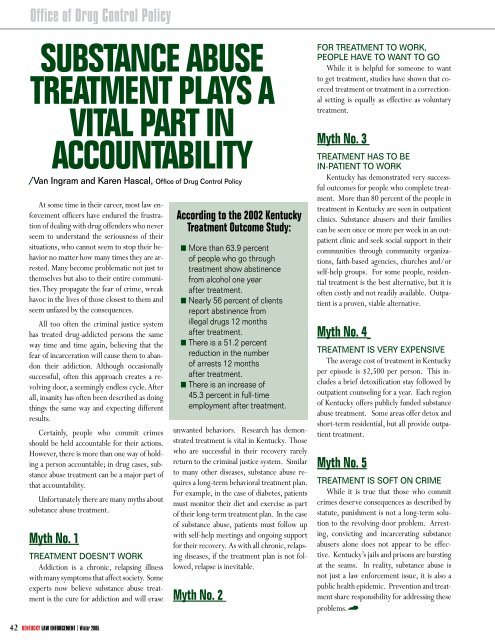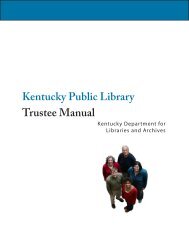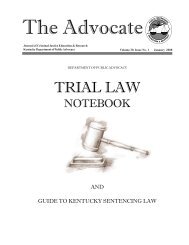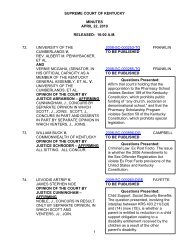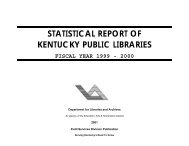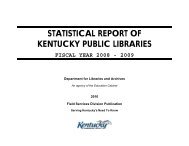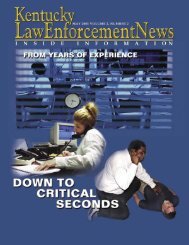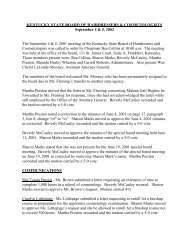4 - e-archives Home
4 - e-archives Home
4 - e-archives Home
You also want an ePaper? Increase the reach of your titles
YUMPU automatically turns print PDFs into web optimized ePapers that Google loves.
Office of Drug Control Policy<br />
sUBsTaNCe aBUse<br />
TReaTMeNT PlaYs a<br />
VITal PaRT IN<br />
aCCoUNTaBIlITY<br />
/van ingram and Karen hascal, office of drug Control Policy<br />
at some time in their career, most law enforcement<br />
officers have endured the frustration<br />
of dealing with drug offenders who never<br />
seem to understand the seriousness of their<br />
situations, who cannot seem to stop their behavior<br />
no matter how many times they are arrested.<br />
Many become problematic not just to<br />
themselves but also to their entire communities.<br />
they propagate the fear of crime, wreak<br />
havoc in the lives of those closest to them and<br />
seem unfazed by the consequences.<br />
all too often the criminal justice system<br />
has treated drug-addicted persons the same<br />
way time and time again, believing that the<br />
fear of incarceration will cause them to abandon<br />
their addiction. although occasionally<br />
successful, often this approach creates a revolving<br />
door, a seemingly endless cycle. after<br />
all, insanity has often been described as doing<br />
things the same way and expecting different<br />
results.<br />
Certainly, people who commit crimes<br />
should be held accountable for their actions.<br />
However, there is more than one way of holding<br />
a person accountable; in drug cases, substance<br />
abuse treatment can be a major part of<br />
that accountability.<br />
unfortunately there are many myths about<br />
substance abuse treatment.<br />
Myth No. 1<br />
TreaTmenT doesn’T WorK<br />
addiction is a chronic, relapsing illness<br />
with many symptoms that affect society. some<br />
experts now believe substance abuse treatment<br />
is the cure for addiction and will erase<br />
4 KENTUCKY LAW ENFORCEMENT| Winter 2005<br />
according to the 2002 Kentucky<br />
Treatment outcome study:<br />
More than 63.9 percent<br />
of people who go through<br />
treatment show abstinence<br />
from alcohol one year<br />
after treatment.<br />
Nearly 56 percent of clients<br />
report abstinence from<br />
illegal drugs 12 months<br />
after treatment.<br />
There is a 51.2 percent<br />
reduction in the number<br />
of arrests 12 months<br />
after treatment.<br />
There is an increase of<br />
45.3 percent in full-time<br />
employment after treatment.<br />
unwanted behaviors. research has demonstrated<br />
treatment is vital in Kentucky. those<br />
who are successful in their recovery rarely<br />
return to the criminal justice system. similar<br />
to many other diseases, substance abuse requires<br />
a long-term behavioral treatment plan.<br />
For example, in the case of diabetes, patients<br />
must monitor their diet and exercise as part<br />
of their long-term treatment plan. In the case<br />
of substance abuse, patients must follow up<br />
with self-help meetings and ongoing support<br />
for their recovery. as with all chronic, relapsing<br />
diseases, if the treatment plan is not followed,<br />
relapse is inevitable.<br />
Myth No. 2<br />
for TreaTmenT To WorK,<br />
PeoPle have To WanT To Go<br />
While it is helpful for someone to want<br />
to get treatment, studies have shown that coerced<br />
treatment or treatment in a correctional<br />
setting is equally as effective as voluntary<br />
treatment.<br />
Myth No. 3<br />
TreaTmenT has To be<br />
in-PaTienT To WorK<br />
Kentucky has demonstrated very successful<br />
outcomes for people who complete treatment.<br />
More than 80 percent of the people in<br />
treatment in Kentucky are seen in outpatient<br />
clinics. substance abusers and their families<br />
can be seen once or more per week in an outpatient<br />
clinic and seek social support in their<br />
communities through community organizations,<br />
faith-based agencies, churches and/or<br />
self-help groups. For some people, residential<br />
treatment is the best alternative, but it is<br />
often costly and not readily available. Outpatient<br />
is a proven, viable alternative.<br />
Myth No. 4<br />
TreaTmenT is very eXPensive<br />
the average cost of treatment in Kentucky<br />
per episode is $2,500 per person. this includes<br />
a brief detoxification stay followed by<br />
outpatient counseling for a year. each region<br />
of Kentucky offers publicly funded substance<br />
abuse treatment. some areas offer detox and<br />
short-term residential, but all provide outpatient<br />
treatment.<br />
Myth No. 5<br />
TreaTmenT is sofT on Crime<br />
While it is true that those who commit<br />
crimes deserve consequences as described by<br />
statute, punishment is not a long-term solution<br />
to the revolving-door problem. arresting,<br />
convicting and incarcerating substance<br />
abusers alone does not appear to be effective.<br />
Kentucky’s jails and prisons are bursting<br />
at the seams. In reality, substance abuse is<br />
not just a law enforcement issue, it is also a<br />
public health epidemic. Prevention and treatment<br />
share responsibility for addressing these<br />
problems. J


